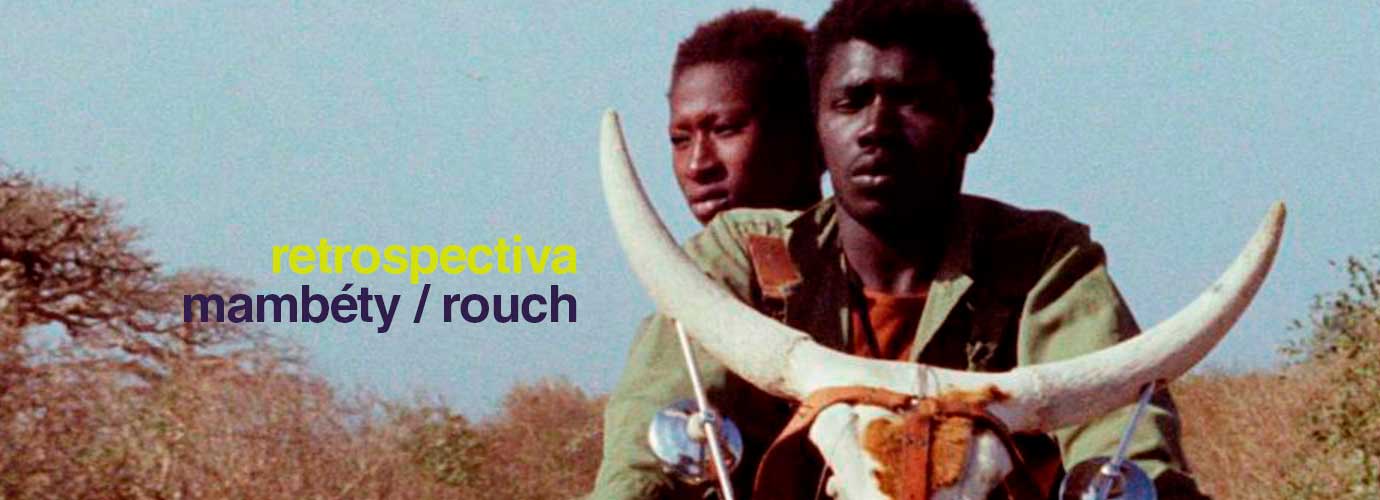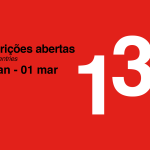
-
2 de May de 2018
Retrospective 2018 – Mambéty/Rouch
Olhar de Cinema is proud to present a dialogue between two influential filmmakers in the history of cinema. The Retrospective section of the seventh edition of the Olhar de Cinema – Curitiba International Film Festival will also be the festival’s first-ever dual retrospective. During the festival’s dates of June 6th-14th – a few weeks after the Cannes Classics screening of a new restoration of his great film Hyenas (1992) – a near-complete gathering of films directed by Senegalese master Djibril Diop Mambéty will screen in commemoration of the 20 years that have passed since his death. And, together with Mambéty’s works, a suite of films will screen whose new restorations premiered last year to coincide with the centenary of their director, Jean Rouch.


“The pairing of these two filmmakers allows us to dive deep into two sides of the same story,” says Olhar de Cinema’s director and director of programming, Antônio Junior. “Their works simultaneously complement each other and clash in ways that provide a unique chance to reflect on cinema’s social role. The experience of watching in concert two different styles and approaches to depicting the world, formed by two distinctly different sets of life experiences, strengthens the force that each auteur’s work holds on its own. Yet, above all else, the chance to observe the differences between Djibril Diop Mambéty and Jean Rouch’s works at our present time, decades after their making, reveals to us great filmmakers who were equally sensitive humanists.”
Jean Rouch was born in France in 1917 and passed away in 2004 in a car accident in his adopted home of Niger, a country that he first visited in 1941 as a hydrology engineer supervising a construction project. Rouch became fascinated by local rituals and ceremonies that he eventually documented in a number of films made there as well as in other European colonies and former colonies in Sub-Saharan Africa over more than half a century. While most of Rouch’s films were considered documentaries upon their releases, films such as The Mad Masters (1955), Moi, un noir (1958), and many others were actually comprised of elaborate mixtures of staged and reenacted scenes with vérité recordings. Almost all of these films were made in intimate collaboration with their human subjects, such as the traditional healer and frequent Rouch star Damouré Zika. Rouch made more than 100 such works, which he called “ethnofictions”, in African locales as well as back in his birth country, where he told interviewers that he felt like a foreigner.

Djibril Diop Mambéty was born in Senegal in 1945 and died, too young, from lung cancer in France in 1998. He was a poet, theater artist, orator, and musician who also directed seven remarkable films over a period of roughly 30 years. Most of the films are allegorical fictions that are tragicomic in nature and that are made with Senegalese people in their natural homes and surroundings. Mambéty’s protagonists in films like Touki Bouki (1973) and Le Franc (1994) are autonomous citizens who move between visions of utopia and of dystopia as they struggle with feeling like colonial subjects. They dream of leaving home to gain wealth in Europe and of returning from Europe to bring wealth back home, and the films watch them playing roles of colonized and colonizer while rarely judging them. Instead, much more often, Mambéty shows his characters holding freedom to choose what they will be.
Rouch began making films two decades before the premieres of the first films directed by filmmakers from Sub-Saharan Africa. Mambéty made his first film, the anarchic short Contras’city (1968), eight years after Senegal’s government declared independence and two years after his countryman Ousmane Sembène’s Black Girl (1966) debuted to consideration as the first Sub-Saharan African feature. Rouch became an important reference not only for Jean-Luc Godard and other French New Wave filmmakers, but also for African filmmakers such as Senegalese director Safi Faye, who starred in his film Little by Little (1969). And while Mambéty has been praised as a powerful influence by African filmmakers such as Souleymane Cissé and Abderrahmane Sissako, he has also been taken as a reference point by contemporary filmmakers from other continents, including the American director Billy Woodberry and his own French niece, actress-director Mati Diop.
The following six films directed by Djibril Diop Mambéty have been confirmed for the retrospective. They will all screen in their best existing digital versions:

– Contras’city (1968, 22min, DVD provided by the Institut Français do Brasil)
– Touki Bouki (1973, 89min, restored DCP provided by the Cineteca di Bologna and by the World Cinema Project: http://www.film-foundation.org/world-cinema)

– Let’s Talk, Grandmother (Parlons Grand-mère, 1990, 33min, restored HD copy provided by Pierre-Alain Meier and Thelma Film: http://princefilm.ch/en/)
– Hyenas (Hyènes, 1992, 111min, restored DCP provided by Pierre-Alain Meier and Thelma Film)

– Le Franc (1994, 44min, digital copy provided by Silvia Voser and Waka Films: http://www.kenbugulfilm.com/waka-films.html)
– The Little Girl Who Sold the Sun (La Petite Vendeuse de Soleil, 1999, 43min, restored DCP provided by Silvia Voser and Waka Films)
The following nine films directed by Jean Rouch have also been confirmed for the Retrospective. All of these films will screen on newly restored DCPs provided by the French company Les Films du Jeudi (http://www.filmsdujeudi.com/fr/index.php), with the exception of Chronicle of a Summer, which will screen on Blu-ray courtesy of the Institut Français do Brasil:

– The Mad Masters (Les Maîtres fous, 1955, 29min)

– Mammy Water (1956, 19min)
– Moi, un noir (1958, 74min)
– Chronicle of a Summer (Chronique d’un été, co-directed with Edgar Morin, 1961, 90min)
– The Human Pyramid (La Pyramide humaine, 1961, 93min)
– The Punishment (La Punition ou les fausses rencontres, 1962, 64min)
– The Lion Hunters (La Chasse au lion à l’arc, 1965, 81min)

– Jaguar (1967, 93min)
– Little by Little (Petit à petit, 1969, 96min)
Key collaborators in the Retrospective also include the North American company Icarus Films (http://www.icarusfilms.com/if-rouch) and Teemour Diop Mambéty, who is the son of Djibril Diop Mambéty and founding director of the company MD Crossmedia (https://vimeo.com/mdcrossmedia).
“By proposing an unprecedented convergence between two filmmakers who held different points of view but overlapped in time and space, the retrospective reveals the stylistic and thematic particularities and similarities in their incredible bodies of work,” says Carla Italiano, a programmer of feature-length films at Olhar de Cinema and one of the retrospective’s two curators (together with Aaron Cutler). “Rouch’s trajectory falls towards the field of anthropology with its encounters shared between the filmmaker and his characters, which, while often staged, always seem to take place in improvised and spontaneous ways. Mambéty’s films, meanwhile, show the unions of different modes of artistic creation, with the tremendous formal liberty of the works always grounded in music and in poetry as their sources of inspiration. These two filmographies, each in its way, present inventive means to break the bounds between documentary and fiction, and they both use humor as a powerful tool in the building of social and historical reflection.”
The retrospective’s activities will include a panel discussion about the legacies of Djibril Diop Mambéty and Jean Rouch’s work, as well as talkbacks with guests following select films. “We hope for the public conversations included in the Retrospective’s program to shed light on topics of relevance to contemporary Brazilian culture and cinema,” Italiano continues. “Most notably, we are concerned with questions of black authorship and representation; with the similarities and differences between the cultures depicted onscreen in the retrospective and the cultural life of contemporary Brazil; and with how the legacies of African roots and a European past have together come to help shape Brazil as it today.”
The retrospective’s full schedule of screenings and activities will be announced shortly. More information about it and about other events at the seventh edition of the Olhar de Cinema – Curitiba International Film Festival will soon appear on the festival’s website, https://woocommerce-460761-1467366.cloudwaysapps.com/ .






